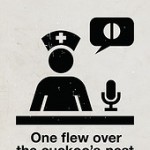In the movie “One flew over the Cuckoo’s Nest” the character known as “Big Nurse” behaves in a rigid, rule oriented manner. She is a “cold, precise woman with calculated gestures and a calm, mechanical manner” who treats her patients as if they are on a level playing field with children.
Her demeanor is symbolic of a mental disrobing which occurs when bosses bully those whom they think are of no consequence. Only the small and insecure feel the need to slam others, or to use a compensatory mechanism to cloak their deficiencies. The way a person treats other people is however a dead giveaway of how they feel about themselves.
As Hornstein notes in his landmark book “Brutal bosses,” bullies prey on those in whom they see weakness. Managers who relegate people into a dual hierarchy negate their inherent equality. They like a “rigged game,” one which they are assured of winning. They equate position with either deference, or the right to wield a big stick. These bureaucrats are a managerial type of slime factor, in which individuals grasp power by “licking upward, kicking downward.” This most unfortunate behavior deprives managers who practice it the opportunity to learn from those more emotionally adept.
If you’re a boss, you’ve forfeited the right to commune with people in a conditional fashion. Promotion to a level at which one is responsible for others simply means that you’ve been given the responsibility of service. As a servant leader, you must take your cue from the people entrusted to your care. In order to learn how to better serve them, try to the following:
- Institute a survey – one with anonymous feedback, in which employees can express how they feel about your style, your mannerisms, and the way in which you treat them. In some organizations developmental feedback is not used for raise/promotion purposes, but rather as a tool to help managers build upon their strengths and minimize their weaknesses.
- Engage in a personal plan of continuous development. Canfield mentions in his chapter “Commit to consistent and never ending improvement” that we should look for experiences that enhance our skill set. Similarly, in his chapter “Learn more to earn more” he suggests we can benefit by (a) decreasing our TV time; (b) reading more; (c) studying the lives of great people (e.g., Profiles in Courage); (d) being teachable; and (e) attending human potential training. He sagely observes: “Nothing will change unless you do.”
Of all the points Canfield makes regarding personal development, I think that “being teachable” is probably the most salient. If managers behave like “master and commander” they may get the job done, but they will alienate employees in the process. Moreover, they will never rectify the deficiencies that prevent them from advancing.
We are all works in progress. Our inextricable linkage and our dependence on one another necessitates mutual learning.





Recent Comments